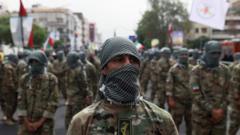Intelligence reports indicate that Iran's elite Revolutionary Guards are engaging criminal gangs to conduct kidnappings and assassinations of dissidents and political opponents overseas, raising alarms among Western intelligence agencies.**
Iran's Alleged Use of Criminal Gangs for International Assassinations Unveiled**

Iran's Alleged Use of Criminal Gangs for International Assassinations Unveiled**
Reports suggest that Iran's Revolutionary Guards have escalated their use of organized crime for hit jobs abroad, posing increasing security concerns worldwide.**
Iran is reportedly intensifying its use of criminal gangs to carry out assassinations and kidnappings of dissidents and political adversaries living abroad, according to findings from Western intelligence agencies. Since 2022, this alarming trend has seen a notable escalation in plots, even involving high-profile individuals such as former President Donald Trump as potential targets. In the UK, authorities are currently investigating several Iranian nationals arrested earlier this month, suspected of plotting an attack that was allegedly aimed at the Israeli embassy in London.
Court documents reviewed by BBC Eye Investigations and BBC Persian reveal that Iran has allegedly been employing underworld networks for these operations, claims that the Iranian government categorically denies. Central to these documents is Naji Sharifi Zindashti, a known Iranian drug smuggler linked to violent crimes. His name frequently appears in relation to significant assassinations, including that of Saeed Karimian in Turkey in 2017. Karimian's murder, deemed to have been orchestrated due to his controversial media work, reportedly involved hired criminals who have ties to Zindashti.
Following Karimian’s death, suspicion grew about Zindashti’s connections to Iran’s intelligence services, especially after another defector, Massoud Molavi, was murdered under similar circumstances, drawing connections between Zindashti and killings of those perceived as threats to the regime. His controversial release from custody in Turkey only fueled notions of collusion with Iranian authorities.
Evidence additionally places Zindashti in connection with a 2020 kidnapping case involving Iranian dissident Habib Chaab. Accusations also extend to his 2021 involvement in a plot to assassinate Iranian defectors in the U.S., halted by an FBI intervention. Reports further indicate that the Revolutionary Guards’ Quds Force partners with international criminal entities for covert operations, tightening the nexus between organized crime and state-sponsored terror.
US and UK authorities have taken actions against individuals tied to these plots, including imposing sanctions on Zindashti and other significant figures. As threats continue to rise, British intelligence reports have revealed 20 credible threats related to Iranian operations directed against individuals in the UK.
Security experts maintain that infiltrating these criminal networks is feasible due to their lack of ideological convictions aligned with the Iranian regime. This interconnectedness raises pressing concerns over the continued safety of dissidents and the international implications of Iran’s use of criminal organizations to maintain control and silence dissent abroad.



















